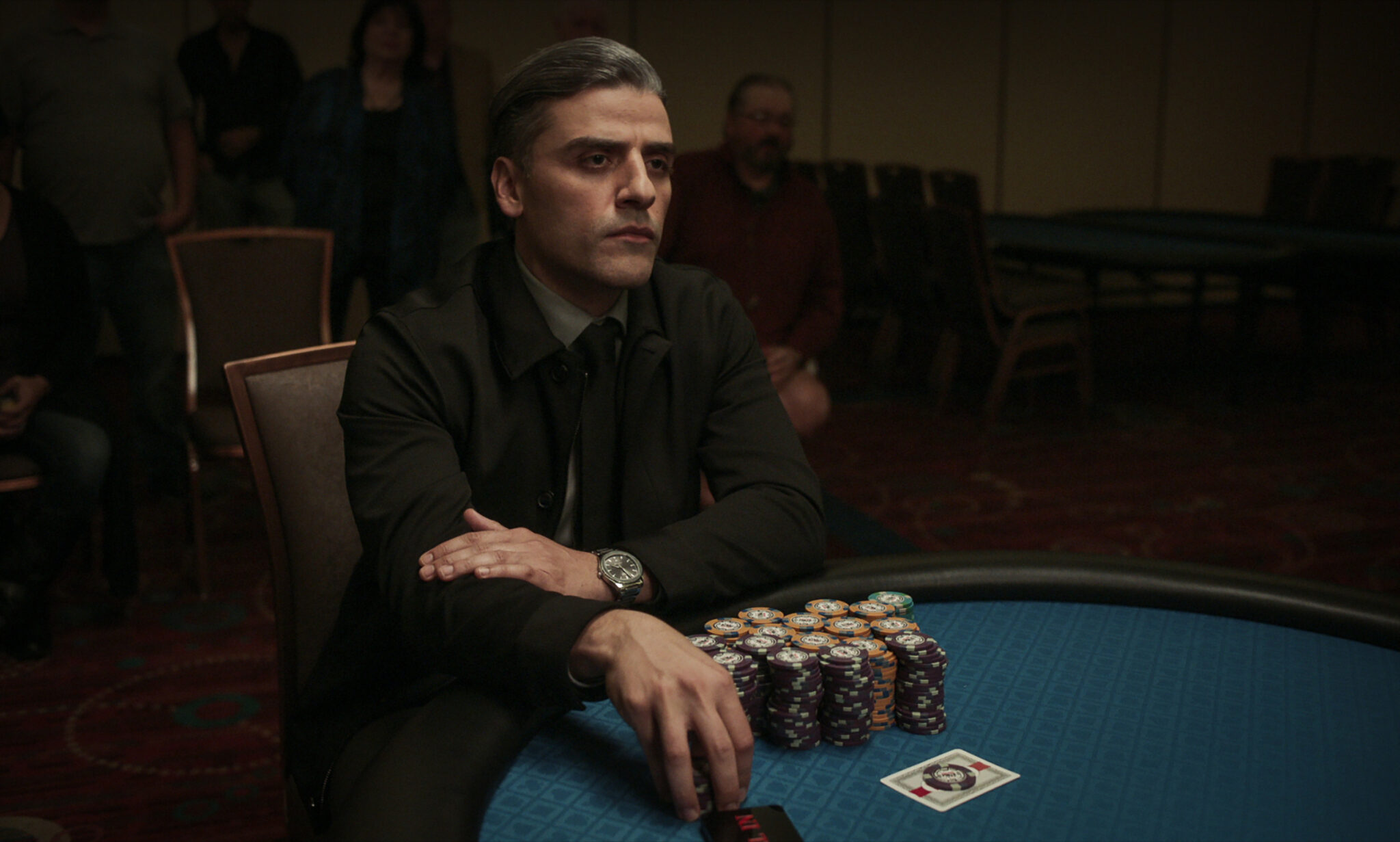 You could be forgiven – upon viewing the title credits of The Card Counter – for thinking that this was a re-release of a movie from the 1970s. The bright green card table cover that forms the background and even the font has that look, that feel. It sets the tone very nicely for a film that definitely feels like it’s from a bygone era; a film that simply doesn’t seem like it would get made nor win screen time in amongst a plethora of superheroes, secret agents and sci-fi sandscapes.
You could be forgiven – upon viewing the title credits of The Card Counter – for thinking that this was a re-release of a movie from the 1970s. The bright green card table cover that forms the background and even the font has that look, that feel. It sets the tone very nicely for a film that definitely feels like it’s from a bygone era; a film that simply doesn’t seem like it would get made nor win screen time in amongst a plethora of superheroes, secret agents and sci-fi sandscapes.
Schrader – the brains behind the likes of Taxi Driver and American Gigolo – is no stranger to moody, atmospheric pieces with conflicting protagonists. Here, he presents us with William ‘Tell’ Tillich (Oscar Isaac), a former US soldier who, having spent time in prison, has become something of an expert gambler. His time inside has provided ample opportunity to work out algorithms and counts. But, as he swaps small stakes wins for bigger tournaments, the arrival of Cirk (Tye Sheridan) threatens to unleash a myriad of ghosts from his troubled past.
Although set in present day, the film – as noted with the title credits – feels like it could be from decades ago. There are neat little touches of influence in there ranging from Hitchcock to Scorsese to de Palma. Every casino is buzzing with noise and lights; little nocturnal pockets of joy and despair. Everything feels laced with tension, unease, as we watch William recall his past as a serving soldier in Abu Ghraib.
The camerawork that accompanies these flashbacks – looking almost like an inverted fish eye – is truly disorientating. The sounds, the colouring, the movement – everything is frantic and chaotic, at complete odds with the rest of the film. The frenzy and horror of these flashbacks gives just the tiniest insight as to what goes on underneath Tell’s flawlessly still exterior.
Despite the weighty subject matter that is explored throughout the film, Schrader really takes his time with it. The pacing creates this really slow burn of tension, with every line of dialogue seeming to practically crackle with subtext. None of the characters really give away their hand, to use a gambling term, and so it’s difficult to anticipate what might happen next. This allows for Isaac to really allow his brooding toxicity to dominate the screen.
Isaac really is on top form, here. ‘Tell’ is taciturn; someone who observes as opposed to someone to talks. He exhibits peculiar, obsessive behaviours – not least the wrapping of his motel rooms in bed sheets – and is clearly still dealing with the traumas of his past. His chemistry with La Linda (Tiffany Haddish) is utterly convincing. He is charismatic and sensuous, showing just a hint at a softer side. His dynamic with Cirk is intense and frightening at times. But – no matter what scene he is in – he absolutely dominates, to the extent where you’ll even be able to pick him out in amongst all the card tables.
 Tiffany Haddish is good as La Linda, who reveals just a little of herself at a time. She’s warm and engaging; a little more willing to be vulnerable. Tye Sheridan is excellent as Cirk, a young man whose life seems to be drifting away from him as a result of his abusive, PTSD-ridden father who served alongside ‘Tell’. He is both an empathetic and frustrating character. Willem Dafoe, despite being on screen for less than ten minutes, is still impactful as Gordo, the sleazy army contractor who, quite literally, has got away with murder.
Tiffany Haddish is good as La Linda, who reveals just a little of herself at a time. She’s warm and engaging; a little more willing to be vulnerable. Tye Sheridan is excellent as Cirk, a young man whose life seems to be drifting away from him as a result of his abusive, PTSD-ridden father who served alongside ‘Tell’. He is both an empathetic and frustrating character. Willem Dafoe, despite being on screen for less than ten minutes, is still impactful as Gordo, the sleazy army contractor who, quite literally, has got away with murder.
Robert Levon Been and Giancarlo Vulcano’s excellent soundtrack really builds on the atmosphere created throughout. Mixing synth, rock and whispering vocals, it’s reminiscent of the superb Drive soundtrack, another film with a conflicting ‘anti-hero’ at its core.
Perhaps the pacing and relative ambiguities of The Card Counter are going to render it unwatchable for some. It is certainly a film that takes its time – allowing characters, scenes and even single lines of dialogue to really breathe. It almost feels like a film that wouldn’t get made nowadays because of these very things that make it such a powerful watch. There is no big reveal; no big shoot out; no big climax.
Instead, it doubles down on an excellent lead performance from Oscar Isaac as to the fragile nature of masculinity and mindset.
The Card Counter is on limited release in UK cinemas.
- The Return – Review from Glasgow Film Festival - March 9, 2025
- Homegrown – Review from Glasgow Film Festival - March 8, 2025
- Nocturnal – Review from Glasgow Film Festival - March 7, 2025




